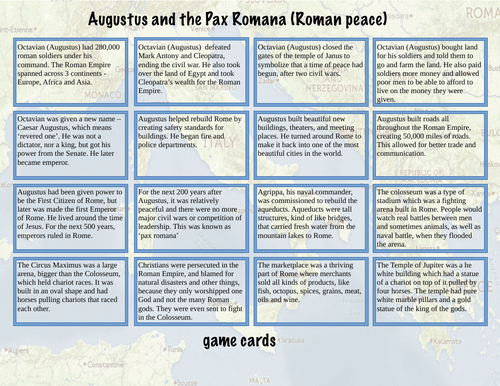

In this game, students pick up information cards and play them on a board to try to get 5 counters in a row.
Augustus, originally named Octavian, was the first emperor of Rome, reigning from 27 B.C. to A.D. 14. After the assassination of his great-uncle and adoptive father Julius Caesar in 44 B.C., Octavian rose to power through a series of political maneuvers and military victories. He defeated Mark Antony and Cleopatra at the Battle of Actium in 31 B.C., which left him as the unchallenged ruler of Rome. In 27 B.C., he was awarded the title “Augustus” by the Roman Senate, marking the end of the Roman Republic and the beginning of the Roman Empire.
Augustus implemented significant reforms that stabilized the empire, secured its borders, and initiated a period of relative peace and prosperity known as the Pax Romana, or “Roman Peace.” This era lasted for more than two centuries and is characterized by a reduction in large-scale warfare, increased security for trade routes, and a flourishing of arts and culture. Augustus’ reign laid the foundations for this period, which allowed the Roman Empire to expand and prosper, reaching its zenith in terms of territorial extent, economic prosperity, and cultural achievements.
Something went wrong, please try again later.
This resource hasn't been reviewed yet
To ensure quality for our reviews, only customers who have purchased this resource can review it
Report this resourceto let us know if it violates our terms and conditions.
Our customer service team will review your report and will be in touch.